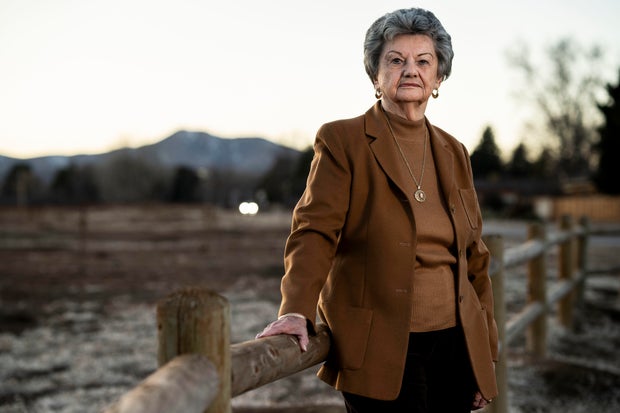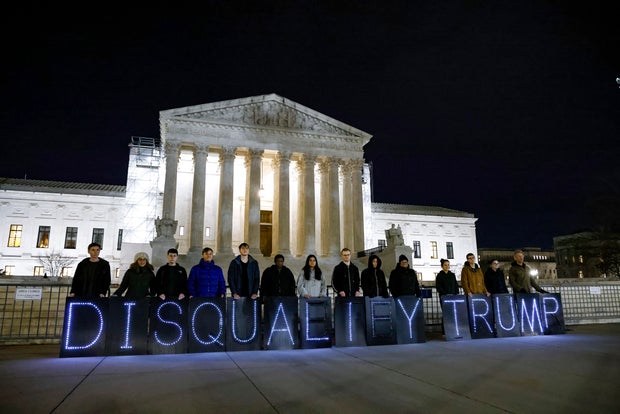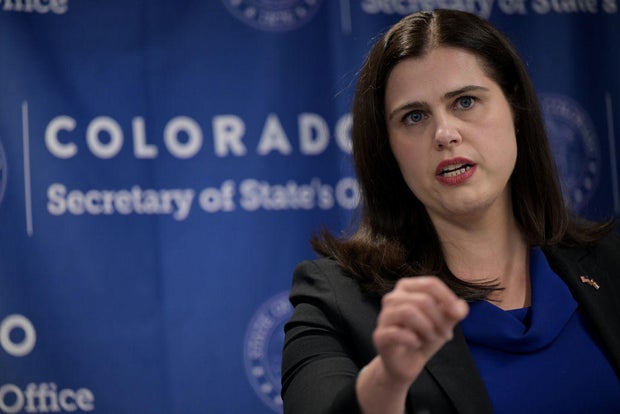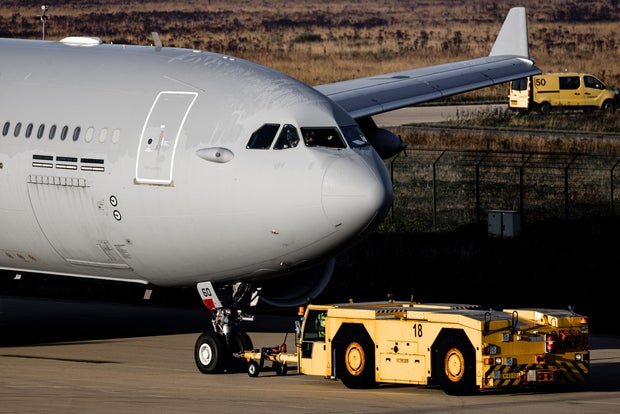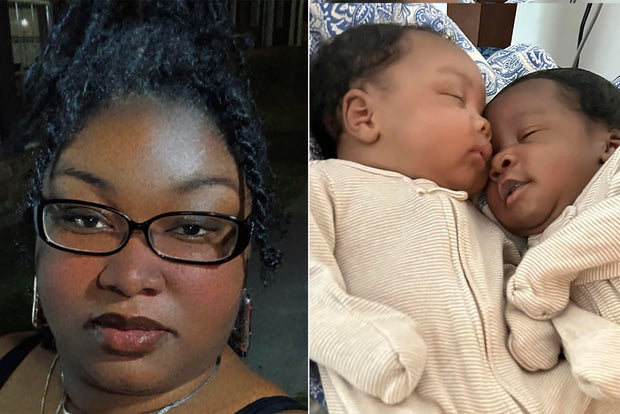CBS News
Trump’s ballot eligibility is headed to the Supreme Court. Here’s what to know about Thursday’s historic arguments.
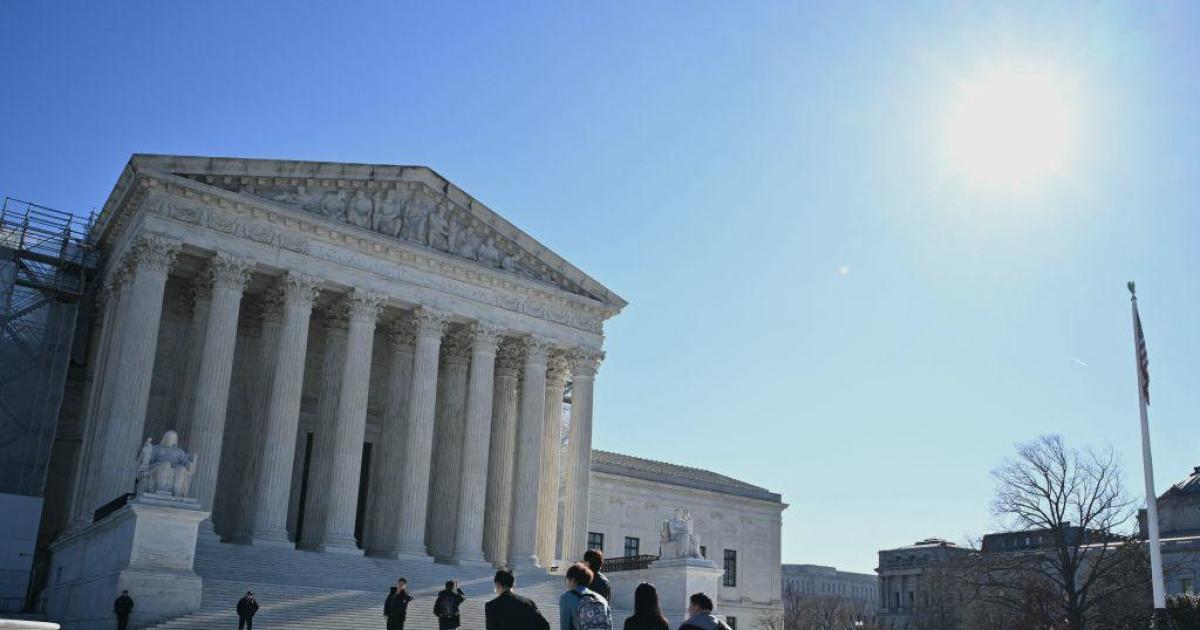
Washington — When the nine members of the Supreme Court take their seats on the bench on Thursday, they will be wading into uncharted legal waters to hear a case that could have sweeping ramifications for the 2024 presidential race.
The dispute before the court involves whether former President Donald Trump is ineligible for a second term in office because of his conduct surrounding the Jan. 6, 2021, assault on the U.S. Capitol. A decision against him could disrupt his bid for a second term in the White House. The outcome of the legal battle is expected to reverberate across all 50 states, since it could provide clarity about Trump’s eligibility for the primary and general election ballots.
At the crux of the case, which arose out of a lawsuit six Colorado voters filed in the fall, is a seldom-used provision of a constitutional amendment passed in 1868 that was designed to keep former Confederates from holding public office.
Known as the insurrection clause, Section 3 of the 14th Amendment had never in the nation’s history been used to disqualify a presidential candidate. That changed in December, when the Colorado Supreme Court concluded that Trump’s conduct related to Jan. 6 deemed him ineligible for the presidency. The court ordered him to be excluded from the state’s GOP presidential primary ballot.
That landmark decision was the catalyst for the high-stakes showdown now before the Supreme Court, which includes three justices appointed by Trump himself. The case, formally known as Trump v. Anderson, raises a number of untested legal questions for the justices to consider and propels the nation’s highest court into a politically fraught dispute just as millions of voters prepare to cast their ballots for the 2024 presidential election.
Not since its ruling in Bush v. Gore in 2000 has the Supreme Court been so squarely in the center of a presidential election.
“It just doesn’t happen very often where you have a provision of the Constitution that is unknown, in some sense, from the point of view of the Supreme Court,” Gerard Magliocca, an expert in Section 3, told CBS News. “Then you say well, it’s about a former president who is running for president and so on — that gives it this added dimension which really has no counterpart that I can think of.”
Why are Colorado voters challenging Trump’s ballot eligibility?
Melina Mara/The Washington Post via Getty Images
The case before the Supreme Court was brought by the watchdog group Citizens for Responsibility and Ethics in Washington on behalf of four Republican and two unaffiliated voters in Colorado in September 2023. The voters argued that Trump is disqualified from holding the presidency under Section 3 and should be excluded from the Colorado primary and general election ballots.
Section 3 bars an individual who swore an oath to support the Constitution and then engaged in insurrection against it from holding federal or state office. Trump, the voters claimed, instigated the Jan. 6 attack as part of his efforts to thwart the peaceful transfer of presidential power after the 2020 election, and therefore is ineligible for a second term.
“If you decide you’re going to undermine your oath, inflame your supporters, make all kinds of allegations that put election workers in harm’s way, and then you foment an attack on the Capitol to stop the peaceful transfer of power, if you do things like that, you don’t get to run again,” said Krista Kafer, a Denver Post columnist and one of the Republican voters who signed on to the lawsuit.
After a five-day trial in Denver, District Judge Sarah B. Wallace determined that the events of Jan. 6 satisfied the definition of insurrection, and concluded Trump engaged in insurrection through incitement — the first time any judge had reached such a conclusion about the former president’s conduct. But Wallace also ruled that Trump should be listed on the Colorado primary ballot because Section 3 does not apply to the presidency and the former president.
The Colorado voters and Trump appealed to the state supreme court, composed of seven justices appointed by Democratic governors. In December, that court issued a 4-3 decision finding that Trump is ineligible for the White House, reversing the district court’s reasoning about the scope of Section 3.
“We do not reach these conclusions lightly. We are mindful of the magnitude and weight of the questions now before us,” the majority wrote. “We are likewise mindful of our solemn duty to apply the law, without fear or favor, and without being swayed by public reaction to the decisions that the law mandates we reach.”
Trump appealed the decision to the U.S. Supreme Court. He and the group of voters urged the justices to take up and decide the question of his eligibility swiftly. On Jan. 5, the high court agreed to consider whether the Colorado Supreme Court erred.
“You’ve got to protect our democracy, because you’ll lose it if you don’t take care of it,” said Norma Anderson, the lead plaintiff in the case.
Anderson, 91, led a long career as a Republican in the Colorado legislature and was the first woman to serve as majority leader in both of its chambers. She recalled crying on Jan. 6 as she watched the mob of Trump’s supporters breach the U.S. Capitol. She said Section 3 came to mind as she watched the events of that day unfold.
“You just don’t try to overthrow an election in the United States, and that’s what he did,” Anderson said.
The arguments in the Trump Supreme Court case
Trump’s appeal pushes the Supreme Court into new territory, as it has never before ruled directly on the application of the 155-year-old clause.
His lawyers are asking the justices to consider a number of issues, including whether the provision applies to Trump as a former president; whether he engaged in insurrection; and whether state and federal courts can even enforce Section 3 without legislation from Congress. They also argued that the provision cannot be used to deny Trump access to the ballot because Section 3 prohibits a person only from holding office, not running as a candidate or winning election.
The Supreme Court only needs to side with the former president on any one of these matters for Trump to prevail.
“The court should put a swift and decisive end to these ballot-disqualification efforts, which threaten to disenfranchise tens of millions of Americans and which promise to unleash chaos and bedlam if other state courts and state officials follow Colorado’s lead and exclude the likely Republican presidential nominee from their ballots,” his lawyers told the justices in their opening brief.
In addition to Colorado, the secretary of state in Maine determined that Trump is barred from holding office and should be excluded from the primary ballot. A state court, though, paused that decision and ordered the secretary of state to reconsider her finding once the Supreme Court rules.
Section 3 says that it applies to those who have taken a constitutional oath “as a member of Congress, or as an officer of the United States, or as a member of any State legislature, or as an executive or judicial officer of any State.” The primary argument from Trump’s legal team is that he is not subject to the provision because the president is not an “officer of the United States.”
His lawyers argued that the president is excluded from the three other instances where the term appears in the Constitution, and the insurrection clause itself does not mention the president or the presidency.
“To accept the Colorado Supreme Court’s assertion that section 3 includes the presidency, one must conclude that the drafters decided to bury the most visible and prominent national office in a catch-all term that includes low-ranking military officers, while choosing to explicitly mention presidential electors,” Trump’s lawyers wrote. “This reading defies common sense.”
Section 3 also says that oath-taking insurrectionists cannot serve in Congress, become a presidential or vice presidential elector or hold “any office … under the United States.” Trump’s legal team argues that there is not clear evidence the presidency fits that definition.
But Magliocca, who testified as an expert witness on the history of Section 3 in the Colorado trial, argued that it created another constitutional qualification for the presidency, like the age, citizenship and residency requirements for lawmakers and the president found elsewhere in the founding document.
“There’s nothing about the history or text of Section 3 that would say there’s anything special about the presidency that makes it exempt, and it would make a hash of the other limitations that the Constitution places on who can be president,” he said.
Trump’s lawyers have asserted that as president, he swore an oath to “preserve, protect and defend” the Constitution, not “support” it, as Section 3 says. Because Trump did not hold public office before he was elected in 2016, he never took an oath to “support” the Constitution, their argument goes.
The voters, though, said that the presidential oath is more demanding, and noted that Trump’s interpretation of Section 3 effectively creates an exception that applies only to him.
“Every other president in our country’s history has taken an oath to support the Constitution, but Trump’s theory is that political neophytes like him who have only taken the presidential oath, and only those political neophytes, fall outside Section 3’s scope, which is the definition of a loophole to say that in our 250-year history, this rule applies to everyone but him,” said Eric Olson, a lawyer who is representing the Colorado voters.
Paul Morigi/Getty Images for MoveOn
Trump is currently the front-runner for the Republican presidential nomination and won the Iowa caucuses and New Hampshire primary, the first two contests of the nomination process. Since Trump is likely to become the GOP nominee, his lawyers told the Supreme Court, the justices should “protect the rights of the tens of millions of Americans who wish to vote” for him.
Olson, though, reiterated that voters often are confronted with limits on who can serve as president. While Taylor Swift may be immensely popular and her fans may want her in the White House, he said, she is only 34 years old, and the Constitution requires the president to be at least 35.
“This notion somehow that it would ‘deprive people of who they want to vote for’ is a shorthand for disregarding the Constitution,” Olson said. “More importantly, having a threat of bedlam used as an argument as to why one side or the other should win is not how the rule of law works in this country.”
Trump’s legal team also claimed that Section 3 is a prohibition only on holding office and does not bar a person from merely running for the White House. Congress can also waive the prohibition on holding office with a two-thirds vote. No court or litigant, they claim, can declare that Trump is “presently” disqualified from holding office without assuming that Congress will refuse to grant him a waiver.
“Anderson may believe or hope that Congress will not waive section 3 between now and January 20, 2029,” Trump’s lawyers wrote. “But neither the Colorado Supreme Court nor this court can declare a candidate ineligible for the presidency now based on a prediction of what Congress may or may not do in the future.”
Press Millen, a North Carolina-based attorney who represented a group of voters who challenged former Rep. Madison Cawthorn’s candidacy for the House under Section 3, warned that the argument that it’s too soon to enforce the provision creates a “potential disaster scenario.”
“It’s a recipe for a disaster and another coup attempt, potentially,” he said. “It doesn’t make a lot of sense, the idea that I can run and you can’t exclude me from the ballot but I can’t hold the office.”
Colorado Secretary of State Jena Griswold, who is urging the Supreme Court to uphold the state high court’s decision, said states have for decades had a role in ensuring only eligible candidates are listed on their ballots.
“For over 100 years, we’ve made determinations as to whether someone was too young, not a resident, not a natural-born citizen, and Section 3 of the 14th Amendment is one of those qualifications,” she said, noting that if a political party wanted to list former California Gov. Arnold Schwarzenegger on the Colorado ballot, for example, her office would not allow it because he is not a natural-born citizen.
Hyoung Chang/The Denver Post
Trump’s actions, Griswold argued, are those of an “insurrectionist,” and the Constitution has a “clear answer to what follows: that person is ineligible from holding office again.”
“The presidency should not be a get-out-of-jail card, and the American people deserve leaders who are qualified to serve in the offices they are running for,” she said.
What happens if the Supreme Court rules in Trump’s favor?
MANDEL NGAN/AFP via Getty Images
The case has divided legal scholars, though many agree it’s imperative for the Supreme Court to settle the disqualification dispute on the merits.
Voters in 15 states, including Colorado, are set to cast their ballots for the Republican primary on March 5, Super Tuesday. Courts in Maine and Oregon have cited the pending case before the Supreme Court in turning away challenges to Trump’s eligibility.
“The idea that you have somebody out there who is, in the view of courts, secretaries of state, whomever, ineligible to run, that needs to be decided,” Millen said. “We need to know that we’ve got eligible candidates going into the general election.”
A victory for Trump could come in several forms. A majority of the justices could find that Section 3 does not apply to the president or office of the presidency. It could determine that Trump did not engage in any event that qualifies as “insurrection,” or conclude that only Congress can enforce Section 3. Five justices could also rule that the Colorado Supreme Court did not have the authority under state election law to order Trump removed from the ballot.
If the Supreme Court rules in favor of Trump on any one of those issues, he would remain on the primary and general election ballots for the 2024 presidential race.
But if a majority of the justices side with the voters and uphold the Colorado Supreme Court’s decision, which many scholars believe is unlikely, he could be barred from holding the presidency, leading states to remove him from their ballots.
“This is what the Constitution commands. Donald Trump engaged in insurrection and is disqualified from holding office again,” Olson said. “The process in Colorado demonstrating Trump’s engagement in that insurrection, how he incited the mob, called them to Washington before that, was overwhelming, and I think a failure to recognize those facts or escape on a legal technicality would do great disservice to the rule of law in our country.”
Referring to a friend-of-the-court brief filed by a group of six experts on democracy, political violence and the rule of law, Olson said, “the only way to preserve our democracy is to uphold our Constitution, and when we shrink away from that bedrock commitment, we threaten the stability and ongoing vitality of our country.”
CBS News
Search efforts continue after Hurricane Helene

Watch CBS News
Be the first to know
Get browser notifications for breaking news, live events, and exclusive reporting.
CBS News
Israel airstrikes rock parts of Lebanon as Hezbollah launch rockets at air base near Haifa

The escalating fighting between Israel and Hezbollah continued Saturday as both sides traded strikes as the war in Gaza nears one year.
The Israel Defense Forces said its air force struck Hezbollah fighters inside a mosque in southern Lebanon that they said was used as a command center to “plan and execute terrorist attacks against IDF troops and the State of Israel.”
The mosque was adjacent to Salah Ghandour Hospital in the town of Bint Jbeil. The hospital said in a statement that Israeli forces had shelled it after being warned to evacuate. The shelling “resulted in nine members of the medical and nursing staff being injured, most of them seriously,” while most of the medical staff were evacuated. On Thursday, the World Health Organization said 28 health workers in Lebanon had been killed in the past 24 hours.
ANWAR AMRO/AFP via Getty Images
At the same time, 12 Israeli airstrikes hit Beirut’s southern suburbs, including one that badly damaged a large hall Hezbollah used to hold ceremonies, Lebanon’s state news agency said.
Later in the day, more strikes hit the area, from which tens of thousands of people have fled over the past two weeks.
Israeli airstrikes also hit areas in southern and eastern Lebanon, according to state media. At least six people were killed, according to NNA.
Meanwhile, Hezbollah said it launched a series of rockets at an Israeli air base near Haifa, about 30 miles from the Lebanese border. Israeli police said fragments of interceptors fell in several sites but no injuries were reported, according to the Associated Press.
Israel has sharply expanded its strikes on Lebanon in recent weeks after nearly a year of exchanging fire with the Iran-backed Hezbollah — long designated a terrorist organization by the U.S., Israel and many other nations. The IDF has been carrying out nightly bombardment of Beirut’s once densely populated southern suburbs, a stronghold of Hezbollah. Overnight, a military spokesman issued three alerts for residents there to evacuate.
Houssam Shbaro/Anadolu via Getty Images
Nearly a week of Israeli ground operations in southern Lebanon, near Israel’s northern border, and two weeks of airstrikes in that region and in southern Beirut — both Hezbollah strongholds — had killed more than 2,000 people, the health ministry said. More than 1 million people have been driven from their homes, including tens of thousands under Israel evacuation orders in almost 100 towns and villages near the border.
Hezbollah started launching those attacks in support of its ideological ally Hamas, which is also backed by Iran, the day after Hamas sparked the ongoing war in Gaza with its Oct. 7, 2023 terrorist attack on Israel. The IDF says Hezbollah militants have fired over 10,000 rockets across the border since Oct. 8, 2023. The vast majority of them have been intercepted by Israel’s advanced missile defense systems.
Israel conducts more ground raids
The Israeli military said on Saturday its special forces were carrying out ground raids against Hezbollah infrastructure in southern Lebanon, destroying missiles, launchpads, watchtowers and weapons storage facilities. The military said troops also dismantled tunnel shafts that Hezbollah used to approach the Israeli border.
Some 1.2 million people have been driven from their homes since Israel escalated its strikes in late September aiming to cripple Hezbollah and push it away from the countries’ shared border. On Tuesday, Israel launched what it calls a limited ground operation into southern Lebanon.
Nine Israeli troops have been killed in close fighting in the area in the past few days, which is saturated with arms and explosives, the military said.
Americans attempt to leave Lebanon
The U.S. government has warned Americans not to travel to Lebanon since mid-September and urged any citizens in the country to leave via commercial travel routes. As of Friday night, the U.S. State Department has assisted approximately 500 U.S. citizens, permanent residents and their families to leave Lebanon on flights organized by the agency.
Other nations are also working to evacuate their residents from Lebanon. Germany has evacuated 460 citizens on German military flights, while a Dutch military transport plane carried more than 100 citizens out of Lebanon. There were also citizens of Belgium, Finland and Ireland who were repatriated on that flight.
ROB ENGELAAR/ANP/AFP via Getty Images
“It’s great that these people are safely back in the Netherlands. These have been tense times for them,” Christiaan Rebergen, secretary-general of the foreign ministry, said after they landed Friday.
Fighting ongoing in Gaza
Palestinian medical officials say Israeli strikes in northern and central Gaza early Saturday have killed at least nine people, including two children.
One strike hit a group of people in the northern town of Beit Hanoun, killing at least five people, including two children, according to the Health Ministry’s Ambulance and Emergency service.
Another strike hit a house in the northern part of Nuseirat refugee camp, killing at least four people, the Awda hospital said. The strike also left a number of wounded people, it said.
The Israeli military did not have any immediate comment on the strikes but has long accused Hamas of operating from within civilian areas.
Earlier in the day, the Israeli military had warned residents in parts of central Gaza to evacuate, saying its forces would soon operate there in response to Palestinian militants.
The warnings cover areas along a strategic corridor in central Gaza, which was at the heart of obstacles to a ceasefire deal earlier this summer. The military warned Palestinians in areas of Nuseirat and Bureij refugee camps, located along the Netzarim corridor, to evacuate to an along Gaza’s shore called Muwasi, which the military has designated a humanitarian zone. It’s unclear how many Palestinians are currently living in the areas affected by the order, parts of which were evacuated previously.
Almost 42,000 Palestinians have been killed in Gaza during the almost year-long war, according to the Palestinian Health Ministry, which does not differentiate between civilian and militant deaths.
CBS News
1-month-old twins who died with mother believed to be the youngest-known Hurricane Helene victims
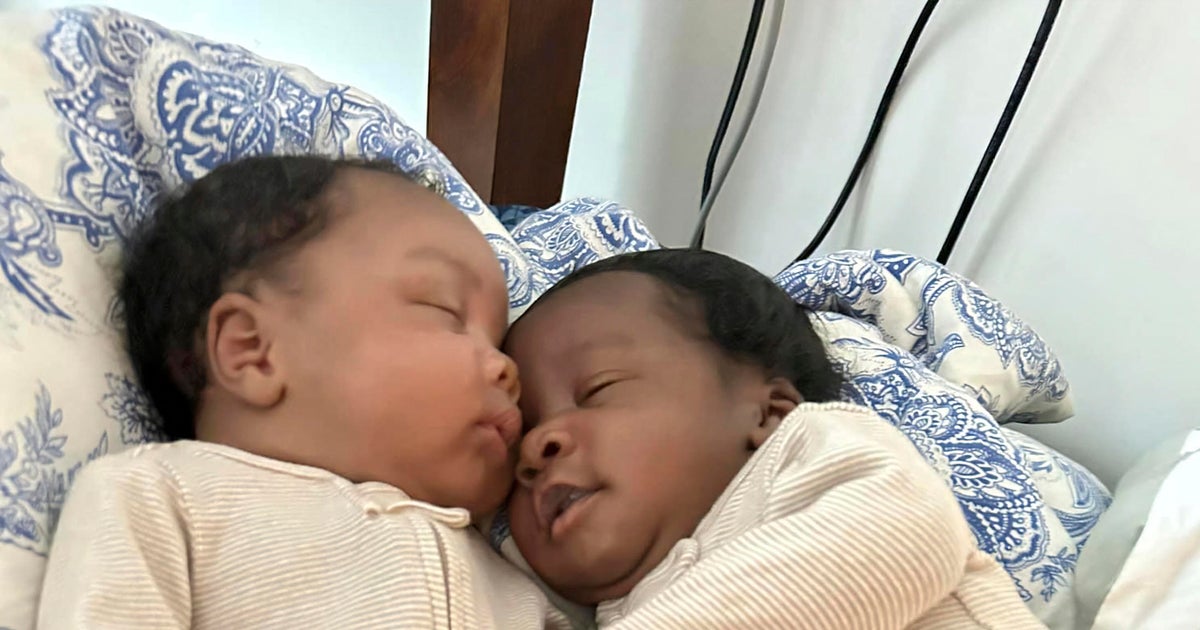
Month-old twin boys are believed to be the youngest known victims of Hurricane Helene. The boys died alongside their mother last week when a large tree fell through the roof of their home in Thomson, Georgia.
Obie Williams, grandfather of the twins, said he could hear babies crying and branches battering the windows when he spoke with his daughter, Kobe Williams, 27, on the phone last week as the storm tore through Georgia.
The single mother had been sitting in bed holding sons Khyzier and Khazmir and chatting on the phone with various family members while the storm raged outside.
AP
Kobe’s mother, Mary Jones, was staying with her daughter, helping her take care of the babies. She was on the other side of the trailer home when she heard a loud crash as a tree fell through the roof of her daughter’s bedroom.
“Kobe, Kobe, answer me, please,” Jones cried out in desperation, but she received no response.
Kobe and the twins were found dead.
“I’d seen pictures when they were born and pictures every day since, but I hadn’t made it out there yet to meet them,” Obie Williams told The Associated Press days after the storm ravaged eastern Georgia. “Now I’ll never get to meet my grandsons. It’s devastating.”
The babies, born Aug. 20, are the youngest known victims of a storm that had claimed more than 200 lives across Florida, Georgia, Tennessee, Virginia and the Carolinas. Among the other young victims are a 7-year-old girl and a 4-year-old boy from about 50 miles (80 kilometers) south in Washington County, Georgia.
“She was so excited to be a mother of those beautiful twin boys,” said Chiquita Jones-Hampton, Kobe’ Jones’ niece. “She was doing such a good job and was so proud to be their mom.”
Jones-Hampton, who considered Kobe a sister, said the family is in shock and heartbroken.
In Obie Williams’ home city of Augusta, 30 miles east of his daughter’s home in Thomson, power lines stretched along the sidewalks, tree branches blocked the roads and utility poles lay cracked and broken. The debris left him trapped in his neighborhood near the South Carolina border for a little over a day after the storm barreled through.
He said one of his sons dodged fallen trees and downed power lines to check on Kobe, and he could barely bear to tell his father what he found.
Many of his 14 other children are still without power in their homes across Georgia. Some have sought refuge in Atlanta, and others have traveled to Augusta to see their father and mourn together, he said.
He described his daughter as a lovable, social and strong woman. She always had a smile and loved to make people laugh, he said.
And she loved to dance, Jones-Hampton said.
“That was my baby,” Williams said. “And everybody loved her.”


